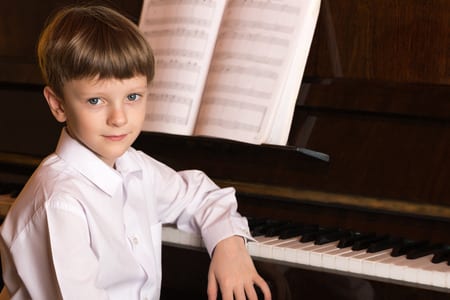
This is a very common question in today’s society, yet one that’s often underestimated or misunderstood. Lots of parents and children alike deny the necessity to practice, learn, or study music at a young age. In fact, plenty of children have grown up to resent music and the instrument they were taught or “forced” to play at a young age through music lessons.
With this being said, it should then become apparent as to why it’s so important to understand, respect and love your child with support regardless of what he or she decides. It’s worth accepting that your child may or may not enjoy music. However, there are ways to counteract this or influence your child more to be inclined to understand music and even develop an interest and ability to play an instrument such as the piano or violin later on in life.
How can I Influence Music on My Child?
Starting at birth to approximately age three, you can influence and condition your baby to enjoy and understand what rhythm is, dancing, and its relationship to music. Doing so can be as simple as holding, dancing, and singing with your baby while you bond together and listen to music.
Also, playing various instruments and finding a genre that your baby or child has a special liking to is great for reinforcement. Understand this, when your child is at such a young age it’s unrealistic to expect that he or she should learn how to actually play, or master a musical instrument.
As your child ages, particularly between ages 5 to 9 this is the best time in which you may expose your child to a specific instrument, how it’s played through videos, or private music lessons. Interacting with other young children and playing musical instruments together is a great way for you and your child to get started.
Learning a Musical Instrument: Facts v. Myths
It’s important to understand that although famous musical composers such as Beethoven, Stevie Wonder, or Mozart started performing music professional or schooling at unusually young ages, this is atypical to the realities of children and learning instruments. Some might even call these musical professionals “geniuses”. This, however, doesn’t mean that your child can’t learn and master or begin to master a musical instrument at a young age through music lessons.
Any child at any age is never too young or too old to understand, practice, or learn a musical instrument. But according to scientific research a child is most prone to comprehending, studying, and learning a musical instrument rapidly during the ages of 1 and 10 or 11 years old, especially instruments such as the piano. Because of this, it’s understandable why so many parents try to get their children into musical lessons during these ages.
However, as mentioned earlier, you must maintain realistically, and respect your child or children’s wishes. The last thing you’d want is for them to resent you or the musical instrument and even music altogether. What’s an ideal musical instrument to start your child with at a young age? The most popular and practical instruments seem to be the violin or piano, so give either one consideration and a shot with your child.
Image credit: bcrbnbvtw